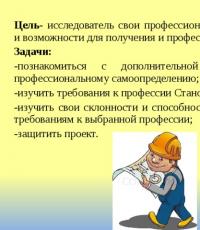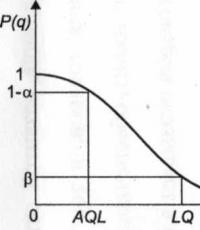Salaries of specialists not related to general industry positions. Professional qualification groups for general industry positions
PKG
Professional qualification groups(PKG) are groups of occupations of workers and positions of employees of state and municipal institutions, united by areas of activity and taking into account the level of qualifications of such workers (Article 144 of the Labor Code of the Russian Federation). We will tell you more about what PKG positions are in our consultation.
How are PCGs formed?
The PKG and the criteria for classifying blue-collar professions and office positions as PKG are approved by the Ministry of Health and Social Development (Article 144 of the Labor Code of the Russian Federation).
Groups of professions and positions are approved within a particular field of activity. Currently, for example, the following PKGs are approved:
| Scope of activity of employees of state and municipal institutions | Order of the Ministry of Health and Social Development |
|---|---|
| Medicine and pharmaceuticals | dated 06.08.2007 No. 526 |
| Education | dated 05.05.2008 No. 216n |
| Agriculture | dated July 17, 2008 No. 339n |
| Print mass-media | dated July 18, 2008 No. 342n |
| physical Culture and sport | dated 02/27/2012 No. 165n |
In addition, the Ministry of Health and Social Development approved the PCG industry-wide positions managers, specialists and employees (Order of the Ministry of Health and Social Development dated May 29, 2008 No. 247n) and general industry professions workers (Order of the Ministry of Health and Social Development dated May 29, 2008 No. 248n). In these directories of professional qualification groups, positions and professions are given without reference to a specific field of activity of the state or municipal institution.
Qualification level for PKG
The positions of employees and professions of workers in the PCG, approved by the Ministry of Health and Social Development, are distributed according to qualification levels that reflect the amount of knowledge, skills, professional skills and work experience of workers.
PKG salary: what is it?
Labor legislation contains the concepts of base salary (basic official salary), base rate wages. They mean, respectively, the minimum salary ( official salary), the wage rate of an employee of a state or municipal institution assigned to the relevant PKG, excluding compensation, incentives and social payments (
font size
ORDER of the Federal Drug Control Service of the Russian Federation dated 08/28/2008 270 (as amended on 03/23/2009) ON APPROVAL OF THE SIZE OF OFFICIAL SALARY (TARIFF RATES) OF EMPLOYEES... Relevant in 2018
Appendix 1. SALARIES FOR PROFESSIONAL QUALIFICATION GROUPS OF GENERAL INDUSTRY POSITIONS OF MANAGERS, SPECIALISTS AND EMPLOYEES
Professional qualification group "General industry positions of first-level employees"
| Qualification levels | ||
| 1 qualification level | Clerk | 3010 |
| Cashier | 3010 | |
| Codifier | 3010 | |
| Commandant | 3010 - 3501 | |
| Freight Forwarder | 3010 - 3153 | |
| 2872 - 3153 | ||
| 2 qualification level | Positions of employees of the 1st qualification level for which the derivative job title “senior” can be established | 3010 - 3501 |
| Qualification levels | Positions assigned to qualification levels | Official salary (rubles per month) |
| 1 qualification level | Administrator | 3153 - 4269 |
| Dispatcher | 3153 | |
| HR inspector | 3153 | |
| Laboratory assistant | 3153 | |
| Technician | 3153 | |
| Row - Excluded. | ||
| (as amended by the Order of the Federal Drug Control Service of the Russian Federation dated March 23, 2009 N 133) | ||
| Artist | 3885 | |
| Other positions equivalent to the qualification level | 3153 - 3885 | |
| (as amended by the Order of the Federal Drug Control Service of the Russian Federation dated March 23, 2009 N 133) | ||
| 2 qualification level | Warehouse Manager | 3010 - 3153 |
| Head of the household | 3010 - 3153 | |
| Senior Administrator | 4269 - 4379 | |
| Senior dispatcher | 3501 | |
| Chief Inspector | 3501 | |
| Senior Assistant | 3501 | |
| Technician II category | 3501 | |
| Other positions equivalent to the qualification level | 3010 - 3885 | |
| 3 qualification level | Head of the dormitory | 3501 - 6245 |
| Production manager (chef) | 3885 - 6245 | |
| Canteen manager | 4269 - 6747 | |
| Technician category I | 4269 - 4379 | |
| Commodity expert category I | 4379 - 4809 | |
| Row - Excluded. | ||
| (as amended by the Order of the Federal Drug Control Service of the Russian Federation dated March 23, 2009 N 133) | ||
| Artist I category | 4379 - 4809 | |
| Other positions equivalent to the qualification level | 3885 - 4809 | |
| (as amended by the Order of the Federal Drug Control Service of the Russian Federation dated March 23, 2009 N 133) | ||
| 4 qualification level | Foreman | 3885 - 5275 |
| Mechanic | 3885 | |
| Other positions equivalent to the qualification level | 3885 - 5275 | |
| (as amended by the Order of the Federal Drug Control Service of the Russian Federation dated March 23, 2009 N 133) | ||
| 5 qualification level | Garage Manager | 4379 - 7250 |
| Head of the section | 4269 - 6245 | |
| Other positions equivalent to the qualification level | 4269 - 6245 | |
| (as amended by the Order of the Federal Drug Control Service of the Russian Federation dated March 23, 2009 N 133) | ||
Professional qualification group "General industry positions of third-level employees"
| Qualification levels | Positions assigned to qualification levels | Official salary (rubles per month) |
| 1 qualification level | Accountant | 3501 |
| Document specialist | 3885 | |
| Engineer | 3885 | |
| Row - Excluded. | ||
| (as amended by the Order of the Federal Drug Control Service of the Russian Federation dated March 23, 2009 N 133) | ||
| HR Specialist | 3501 - 4379 | |
| Psychologist | 3885 | |
| Software engineer (programmer) | 3885 - 4269 | |
| (as amended by the Order of the Federal Drug Control Service of the Russian Federation dated March 23, 2009 N 133) | ||
| Process engineer (technologist) | 3885 - 4269 | |
| (as amended by the Order of the Federal Drug Control Service of the Russian Federation dated March 23, 2009 N 133) | ||
| Labor safety engineer | 3885 | |
| (as amended by the Order of the Federal Drug Control Service of the Russian Federation dated March 23, 2009 N 133) | ||
| Other positions equivalent to the qualification level | 3501 - 3885 | |
| (as amended by the Order of the Federal Drug Control Service of the Russian Federation dated March 23, 2009 N 133) | ||
| 2 qualification level | Accountant II category | 3885 - 4269 |
| Document specialist II category | 4269 - 4379 | |
| Engineer II category | 4269 - 4379 | |
| Software engineer category II (programmer category II) | 4379 - 4809 | |
| (as amended by the Order of the Federal Drug Control Service of the Russian Federation dated March 23, 2009 N 133) | ||
| Process engineer category II (technologist category II) | 4379 - 4809 | |
| (as amended by the Order of the Federal Drug Control Service of the Russian Federation dated March 23, 2009 N 133) | ||
| Other positions equivalent to the qualification level | 3885 - 4379 | |
| (as amended by the Order of the Federal Drug Control Service of the Russian Federation dated March 23, 2009 N 133) | ||
| 3 qualification level | Accountant category I | 4379 - 4809 |
| Document specialist of the 1st category | 4379 - 4809 | |
| Engineer I category | 4379 - 4809 | |
| Economist category I | 4379 - 4809 | |
| Other positions equivalent to the qualification level | 4379 - 4809 | |
| Software engineer category I (programmer category I) | 5275 - 5778 | |
| (as amended by the Order of the Federal Drug Control Service of the Russian Federation dated March 23, 2009 N 133) | ||
| Process engineer category I (technologist category I) | 5275 - 5778 | |
| (as amended by the Order of the Federal Drug Control Service of the Russian Federation dated March 23, 2009 N 133) | ||
| 4 qualification level | Lead accountant | 5275 - 5778 |
| Lead document specialist | 5275 - 5778 | |
| Lead Engineer | 5275 - 5778 | |
The law on professional standards has been in effect for several months, but not everyone has finally figured out how to apply the new regulations in their companies. To help employers - practical recommendations one of the most authoritative Russian experts By labor law Maria Finatova.
What is this article about? Once again about professional standards, the application of which is still unclear to many. Let's talk about how to learn to determine the professional level at which an employee is.
All qualification levels specified in professional standards are used during their development to describe labor functions, requirements for education and training of workers. Uniform requirements for the qualifications of workers established by qualification levels can be expanded and clarified taking into account the specific types of professional activities.
The skill level is defined as the employee’s ability to perform job functions (tasks, responsibilities) of a certain composition and level of complexity, which is achieved by mastering the necessary set of theoretical knowledge and skills.
The normative act that names qualification levels is the order of the Ministry of Labor and Social protection RF dated April 12, 2013 N 148n “On approval of qualification levels for the purpose of developing draft professional standards.” There are 9 levels in total and each has its own requirements. The higher the level, the higher the requirements; the lower the level, the lower the requirements for the position. Typically, Level 1 is unskilled labor for which there are no strict requirements. 2,3,4 levels of working specialties, 5,6 – specialists, 7,8 heads of the organization, top managers, 9 – country leadership.
Each level has certain indicators, which include: powers and responsibility, the nature of knowledge, the nature of skills and the main ways to achieve qualifications, on the basis of which a professional standard is developed.
For example, at the 1st qualification level they are like this:
And at the 6th qualification level these are:
In order to understand at what level a particular employee is, the employer needs to carry out the whole complex events:
- To begin, select a suitable professional standard for compliance with which the employee’s position will be checked.
- Then analyze his labor function, determined employment contract or job description for its compliance with labor actions (LA) provided for in the selected professional standard.
- Then compare the verified labor actions with labor functions in the same professional standard.
- And finally, from the compared labor functions (LF), determine which or which generalized labor functions (GLF) the employee is suitable for.
For each generalized labor function(OTF) the professional standard indicates the corresponding qualification level. Using a simple procedure, you can determine what qualification level an employee has and what requirements are established for him.
For example, if we take the professional standard of “Accountant”, we can see that there are only 2 qualification levels: 5 and 6 for the positions of “Accountant” and “Chief Accountant”, and accordingly the requirements for these qualification levels different. When comparing, it may turn out that one of the workers does not meet the standard because he does not have enough experience, or seniority, or the necessary education at a certain level for him. In this situation, the employer must solve this problem: in the case of education, by sending the employee to study, in the case of experience and length of service, by transferring the employee to another position.
Situations may be different, but it must be remembered that the requirements of Law No. 122-FZ must be fulfilled by all employers, regardless of their organizational and legal form, form of ownership, number of employees, etc. However, the law does not imply dismissals for non-compliance professional standard. Therefore, it is important and possible to find the right solution in each specific situation with each specific employee.
Maria Finatova, head of the Consulting Projects Department and partner of the Valentina Mitrofanova group of companies







